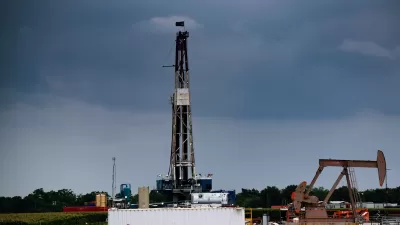A new study aims to broaden the understanding of an increasing number of human-caused earthquakes. Fracking might not be entirely to blame.
Nathan Collins shares news of a new report that finds smart management strategies could ease the risk of earthquakes caused by human activities.
First, however, the study suggest that hydraulic fracking has been taking an inordinate amount of blame for the earthquakes recently shaking places like Oklahoma and Texas.
According to Collins's explanation, "the land in states like Oklahoma is often dry enough that companies drilling for oil and gas don't even need to employ fracking techniques, says United States Geological Survey senior scientist and study co-author William Ellsworth. It's actually industrial wastewater injection, carbon sequestration and storage, and the replenishment of underground reservoirs—things we'd think of as good for the environment—that can cause earthquakes."
The report's suggestion for a management strategy: "simply moving injection sites away from population centers or critical infrastructure, where rare but large earthquakes are the biggest concern."
Hopefully, the owners of fracking operations in the suburban Front Range counties of Colorado, where 5,000 drilling permits have been issued in the last two years, will get the memo.
FULL STORY: Managing the Growing Risk of Human-Made Earthquakes

Planetizen Federal Action Tracker
A weekly monitor of how Trump’s orders and actions are impacting planners and planning in America.

Maui's Vacation Rental Debate Turns Ugly
Verbal attacks, misinformation campaigns and fistfights plague a high-stakes debate to convert thousands of vacation rentals into long-term housing.

San Francisco Suspends Traffic Calming Amidst Record Deaths
Citing “a challenging fiscal landscape,” the city will cease the program on the heels of 42 traffic deaths, including 24 pedestrians.

Amtrak Rolls Out New Orleans to Alabama “Mardi Gras” Train
The new service will operate morning and evening departures between Mobile and New Orleans.

The Subversive Car-Free Guide to Trump's Great American Road Trip
Car-free ways to access Chicagoland’s best tourist attractions.

San Antonio and Austin are Fusing Into one Massive Megaregion
The region spanning the two central Texas cities is growing fast, posing challenges for local infrastructure and water supplies.
Urban Design for Planners 1: Software Tools
This six-course series explores essential urban design concepts using open source software and equips planners with the tools they need to participate fully in the urban design process.
Planning for Universal Design
Learn the tools for implementing Universal Design in planning regulations.
Heyer Gruel & Associates PA
JM Goldson LLC
Custer County Colorado
City of Camden Redevelopment Agency
City of Astoria
Transportation Research & Education Center (TREC) at Portland State University
Jefferson Parish Government
Camden Redevelopment Agency
City of Claremont



























